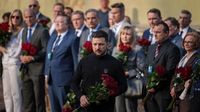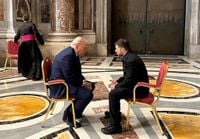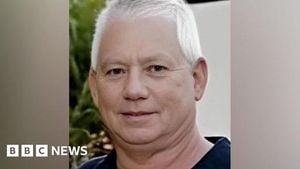In a significant diplomatic development, President Donald Trump has called for high-level talks between Ukraine and Russia, asserting that both nations are "very close to a deal" to end the ongoing conflict that has claimed countless lives over the past three years. This announcement came as Trump arrived in Rome to attend Pope Francis's funeral, where he also engaged in discussions with Ukrainian President Volodymyr Zelenskyy.
On April 25, 2025, Trump took to his Truth Social platform, stating, "It was a good day in talks and meetings with Russia and Ukraine." His envoy, Steve Witkoff, had just met with Russian President Vladimir Putin, further fueling optimism about a potential resolution to the war.
During a recent interview, Trump reiterated his stance on Crimea, declaring, "Crimea will stay with Russia," a statement that has raised eyebrows and concerns among Ukrainian officials. Zelenskyy, in response, has consistently rejected any notion of ceding territory, emphasizing that recognizing occupied regions as Russian is a "red line" for Ukraine.
The conflict has escalated recently, with Russia continuing its bombardment of Ukraine. On the same day Trump made his announcement, a drone strike in southeastern Ukraine resulted in the deaths of three civilians, highlighting the urgent need for a ceasefire. The ongoing violence has prompted Western leaders to accuse Putin of stalling negotiations while seeking to gain more territory.
Amid these tensions, Trump has accused Zelenskyy of prolonging the conflict by resisting negotiations, a claim that has been met with criticism from European allies who argue that Putin's actions are the primary obstacle to peace. As the war nears a pivotal moment, U.S. officials have warned that without a settlement, there may be a halt in military aid to Ukraine, further complicating the situation.
Trump's recent meeting with Zelenskyy at the Vatican, which lasted approximately 15 minutes, was described as "very productive" by White House officials. The two leaders discussed several key issues, including the protection of civilians and the need for a complete and unconditional ceasefire. Zelenskyy characterized the meeting as "symbolic" and potentially historic if it leads to meaningful results.
In a post following their talks, Trump expressed doubts about Putin's desire for peace, criticizing the Russian leader for recent missile attacks on civilian areas. He stated, "There was no reason for Putin to be shooting missiles into civilian areas, cities and towns, over the last few days. It makes me think that maybe he doesn’t want to stop the war." This marked a notable shift in Trump's rhetoric, as he has previously been more lenient towards Putin.
Despite these discussions, significant differences remain between the U.S. and Ukraine regarding the terms of any potential peace agreement. One contentious point is the U.S. proposal to formally recognize Crimea as Russian territory, a move that both Zelenskyy and European allies vehemently oppose. Ukrainian officials argue that such recognition would undermine Ukraine's sovereignty and violate international law.
As the war continues, the humanitarian toll remains dire. Recent Russian strikes have targeted civilian infrastructure, leaving many Ukrainians in peril. The Ukrainian military reported that Russian forces launched over 100 drone attacks overnight, exacerbating the already critical situation.
In the face of these challenges, Ukrainian officials remain steadfast in their commitment to reclaiming occupied territories. Kyiv Mayor Vitali Klitschko suggested that while conceding land might be necessary for a temporary peace, it would not be a long-term solution. He stated, "It’s not fair. But for the peace, temporary peace, maybe it can be a solution, temporary." This sentiment reflects the complex dynamics at play as Ukraine navigates its path towards peace.
As international leaders continue to weigh in on the situation, the potential for a breakthrough remains uncertain. The Trump administration's willingness to recognize Russian control over Crimea could be a dealbreaker for Ukraine, which has made it clear that any agreement must prioritize the restoration of its territorial integrity.
With the stakes higher than ever, the coming days will be critical in determining whether meaningful negotiations can take place. As Trump prepares to leverage his influence in the ongoing talks, both Ukraine and Russia face mounting pressure to find common ground and bring an end to the conflict that has caused immense suffering.
In summary, the recent developments in Ukraine-Russia relations underscore the complexities of international diplomacy amid ongoing hostilities. As Trump and Zelenskyy engage in dialogue, the world watches closely, hoping for a resolution that can finally bring peace to a war-torn region.






